|
|
|
Sort Order |
|
|
|
Items / Page
|
|
|
|
|
|
|
| Srl | Item |
| 1 |
ID:
178422
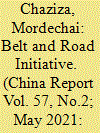

|
|
|
|
|
| Summary/Abstract |
The Republic of Yemen (North Yemen) and the People’s Republic of China (PRC) established diplomatic relations in 1956, the first Arabian Peninsula country to recognise the PRC as the legitimate representative of the country. Yemen is a significant and strategically important state in the southern Arabian Peninsula bordering Saudi Arabia, Oman, the Red Sea, and the Gulf of Aden within the Arabian Sea (Behbehani. 1985. China and the People’s Democratic Republic of Yemen). The geographical location of Yemen makes it an essential state for the PRC because it enables it an observation point over three regional trouble spots: the Gulf of Aden, the Red Sea, and the Horn of Africa. Thus, Yemen can become the bridge between Asia and Africa, and between the Indian Ocean and the Mediterranean, and a vital component of China’s Silk Road Strategy. The Belt and Road Initiative (BRI) could be used as a new driving force for the Sino-Yemen relationship, especially the integration between the state’s post-war reconstruction and the realization of the initiative.
|
|
|
|
|
|
|
|
|
|
|
|
|
|
|
|
| 2 |
ID:
159622


|
|
|
|
|
| Summary/Abstract |
Mediation diplomacy has emerged as one of the central pillars of China’s foreign policy objectives and practice, with Beijing deliberately positioning itself as a peacemaker in the MENA region. This study evaluates China’s role as a regional peacemaker by examining Beijing’s growing engagement with bringing about a peaceful resolution to the MENA disputes. Specifically, this study seeks to examine whether or not China’s mediation efforts in the MENA region augur a shift in China’s non-intervention principle and practice. The study findings show that China’s mediation role is part of a carefully devised strategy that suits the country’s non-intervention policy framework. Therefore, China’s mediation efforts in the MENA conflicts are mostly aimed at constructive conflict management rather than conflict resolution.
|
|
|
|
|
|
|
|
|
|
|
|
|
|
|
|
| 3 |
ID:
120700
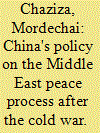

|
|
|
|
|
| Publication |
2013.
|
| Summary/Abstract |
This article focuses on China's policy towards the peace process in the Middle East after the end of the Cold War and the American influence on Chinese policy. China has always charted its policy on the Arab-Israeli peace process to be 'balanced diplomacy', maintaining friendly relations with Arab countries, while not neglecting its relationship with Israel. Furthermore, China's policy regarding the Israeli-Arab peace process contains contradictory elements in its dual relations with the 'peace camp' and the 'radical camp' in the Middle East. Chinese diplomacy finds itself in a complex dilemma, balancing the perils and prospects of its economic and strategic goals in the Middle East and the international arena. As a permanent member of the UN Security Council, China states that it shares the great burden of ensuring that the Middle Eastern peace process is managed correctly. However, its declaration is merely diplomatic rhetoric; Beijing does not actively endeavour to advance the peace process but is mainly interested in promoting its own economic interests and balancing the US hegemony in the region. Therefore, its approach is chiefly one of conflict management, rather than conflict resolution. Paradoxically, by trying to maintain good economic relations with everyone, it helps strengthen forces opposed to peace, such as Iran and Hamas.
|
|
|
|
|
|
|
|
|
|
|
|
|
|
|
|
| 4 |
ID:
175141
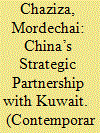

|
|
|
|
|
| Summary/Abstract |
In July 2018, the Kuwaiti Emir made a state visit of great significance to China, as both countries agreed to establish a strategic partnership creating new opportunities for Kuwait, which aspires to diversify its economy and seek investment opportunities. This study investigates various aspects behind the establishment of this partnership and examines the synergy between the Belt and Road Initiative (BRI) and the Kuwait Vision 2035 (KV2035) to understand the extent of economic engagement and relationship between the two nations. However, despite the considerable increase in Chinese trade and investments in Kuwait, some significant internal obstacles and external challenges remain to the successful integration of KV2035 with the BRI.
|
|
|
|
|
|
|
|
|
|
|
|
|
|
|
|
| 5 |
ID:
170659


|
|
|
|
|
| Summary/Abstract |
China–Qatar ties have strengthened considerably in recent years. The relationship between the two countries has seen steady and smooth bilateral development in the political, economic and cultural fields; in trade, energy and other areas and has given active play to the complementarities between the two economies. This study wants to examine the motivation behind Beijing’s measures to formalise a strategic partnership with Qatar to understand the impact and the extent of the Qatar-Gulf crisis on Doha engagement and integration within the Belt and Road Initiative. China’s measures to formalise strategic partnerships with Qatar includes seven major areas for cooperation: policy coordination, connectivity, trade and investments, energy cooperation, financial cooperation, military ties, tourism and cultural ties.
|
|
|
|
|
|
|
|
|
|
|
|
|
|
|
|
| 6 |
ID:
146060
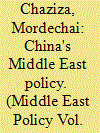

|
|
|
|
|
| Summary/Abstract |
Since the end of the Cold War, Chinese foreign policy in the Middle East has been primarily driven by a search for energy security and a desire to increase its overseas markets and investment opportunities.
|
|
|
|
|
|
|
|
|
|
|
|
|
|
|
|
| 7 |
ID:
163219
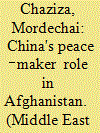

|
|
|
| 8 |
ID:
178440
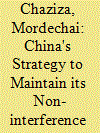

|
|
|
|
|
| Summary/Abstract |
The Middle East is becoming a hotspot for thousands of Chinese businesses with hundreds of thousands of Chinese nationals working and living throughout the region, as well as several million Chinese tourists. Traditionally, China's policies towards the Middle East were based on the principle of non-interference. In face of the increasing number and frequency of acts of violence against Chinese nationals and assets in the region, this study examines whether China's strategy to maintain its non-interference policy can meet the challenge of protecting the safety and rights of Chinese tourists in the Middle East. The main argument is that China's approach to maintaining its non-interference policy is part of a carefully devised strategy that suits the country's doctrine. China's leadership favours a global proactive diplomatic approach which includes five diplomatic and military measures identified in this article: non-combatant evacuation operations and peacekeeping operations; construction of infrastructure and logistical capacities; legal framework and security cooperation; mediation and conflict management; and consular protection. This proactive diplomatic approach is also suitable to meet the challenge of the safety and rights of Chinese tourists in the region.
|
|
|
|
|
|
|
|
|
|
|
|
|
|
|
|
| 9 |
ID:
160307
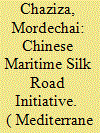

|
|
|
|
|
| Summary/Abstract |
The Mediterranean Sea is one of the most important maritime highways in international trade and a marine traffic hub at the western end of the Chinese Belt and Road Initiative (BRI). This essay examines the role of Mediterranean countries in the construction and realization of the Twenty-First Century Maritime Silk Road Initiative, one of the BRI's two main components. China's maritime activity in the Mediterranean Sea and its shores consists mainly of constructing and operating ports or railways. The investments in sea-lanes and railways complement each other and jointly open new trade links between China and the Eurasia-Africa zone. However, the implementation of a Maritime Silk Road via the Mediterranean Sea cannot succeed unless there is a way to bridge the gap between economic interests and the capacity to protect those interests.
|
|
|
|
|
|
|
|
|
|
|
|
|
|
|
|
| 10 |
ID:
157702
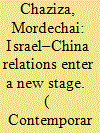

|
|
|
|
|
| Summary/Abstract |
Since the establishment of diplomatic ties between China and Israel in 1992, their relations have warmed up and developed rapidly in diverse areas. This study offers a new theoretical framework, strategic hedging behavior, for analyzing Sino-Israel relations, in order to understand the nature and scope of the hedging relationship between China and Israel. What impact will China’s hedging relationship with Israel have on Washington’s dominance in the Middle East region? The study asserts that this relationship is limited to economics and technology, and China’s relations with Israel cannot replace Israel’s strategic and special relationship with the US. However, the future of the hedging relationship countries is highly sensitive to the evolution of US–China relations in the Middle East and other areas.
|
|
|
|
|
|
|
|
|
|
|
|
|
|
|
|
| 11 |
ID:
189226


|
|
|
|
|
| Summary/Abstract |
There are already signs that the PRC is backing out of the non-interference policy. Perhaps this is the right time to ask if China’s policy of non-interference in other countries internal affairs is ending, especially in light of the BRI grand strategy. The study examines whether China’s policy of non-interference is sustainable in the age of the BRI. Will the PRC be able to maintain its non-interference and neutrality policy, especially if its commercial interests, investments, and citizens living in the GCC countries are threatened? China must moderate its non-interference policy and increasingly intervene to secure overseas economic interests by framing its engagement in a way that eases the perceived breadth and depth of its interference.
|
|
|
|
|
|
|
|
|
|
|
|
|
|
|
|
| 12 |
ID:
131994
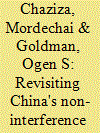

|
|
|
|
|
| Publication |
2014.
|
| Summary/Abstract |
This article evaluates, through statistical analysis, China's foreign policy of non-intervention, and answers the question of whether or not China has kept to its declared policy regarding intrastate wars relative to the other four powers that are permanent members of the UN Security Council. The evidence in this article suggests that the Chinese policy of non-interference was more a declaration than a policy. China significantly lower only from the United States and the USSR/Russia and differs solely in numbers of interventions, their extent, and diversity. Yet China is the only power that has not sent troops to interfere in intrastate wars. The country's share among the powers in supporting actors in intrastate wars is significantly less as time passes, although China exhibited no significantly different trends between the Cold War and the post-Cold War periods. It is, on the contrary, the United States and UK among the powers that have significantly increased their relative share of interference.
|
|
|
|
|
|
|
|
|
|
|
|
|
|
|
|
| 13 |
ID:
164477
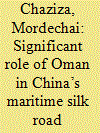

|
|
|
|
|
| Summary/Abstract |
In recent years, China has been seeking to deepen its global centrality by connecting to Asia, Europe, and Africa through investments in physical infrastructure, that is, ports and pipelines, high-speed rail, and other utilities, with associated bilateral trade and investments in critical states along the land- and sea-based Silk Road. Oman is positioned to play a critical role in China’s expanding footprint in the Middle East. Its advantageous maritime location, influence in energy markets, and independent foreign policy make Oman an attractive partner for China and of vital strategic significance in the construction and realization of the twenty-first-century Maritime Silk Road Initiative (MSRI). Oman has enthusiastically embraced China’s MSRI and expressed an eagerness to leverage China’s growing influence in the Middle East to transform itself into a center of global trade and manufacturing.
|
|
|
|
|
|
|
|
|
|
|
|
|
|
|
|
| 14 |
ID:
148508
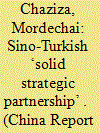

|
|
|
|
|
| Summary/Abstract |
This article analyses the motivation behind China’s measures to formalise a solid strategic partnership with Turkey. One cannot ignore the inherent potential and impact on the region of a Chinese strategic partnership with Turkey and Beijing’s balancing efforts to contain US predominance in the Middle East. However, China’s bilateral relationship with Turkey is essentially limited, with narrow strategic manoeuvrability, which make the two countries unlikely to become solid strategic partners in the foreseeable future. Yet an improved strategy and more sophisticated diplomatic tactics by China could bring it closer to reality.
|
|
|
|
|
|
|
|
|
|
|
|
|
|
|
|
| 15 |
ID:
133740
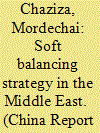

|
|
|
|
|
| Publication |
2014.
|
| Summary/Abstract |
Since the event popularly termed the 'Arab spring' and the changing balance of power in the Middle East, where China has economic interests, there has been a conspicuous balancing behaviour against the United States, the sole superpower. This article discusses whether the Chinese and Russian vetoes on Syria can be interpreted as a potential threat to counterbalance American moves in world politics, particularly in the Middle East. After abstaining on the no-fly zone over Libya, China vetoed thrice on the Syrian crisis. Beijing used its position to frame the agenda of the Security Council and to indirectly challenge US objectives in the region. China's diplomatic cooperation and coordination with Russia displays their mutual determination to check the US' moves in United Nations Security Council (UNSC) debates on the Syrian crisis. Yet, China is still very cautious about confronting the US directly or antagonising it, realising that it is still much weaker than Washington, and would gain nothing from such actions. Therefore, the Chinese strategy is to not engage in hard balancing behaviour, but in soft balancing which allows for the creation of strategic relationships through which hard balancing can occur in the future.
|
|
|
|
|
|
|
|
|
|
|
|
|
|
|
|
|
|
|
|
|